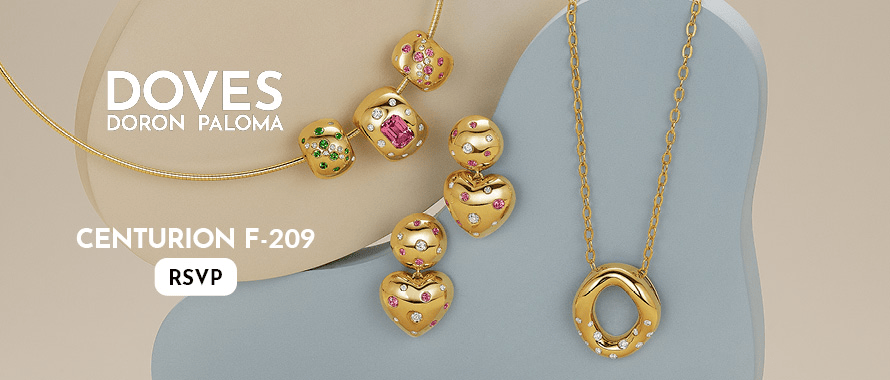Sales Strategy
Five Ways To Improve Millennial Loyalty To Your Company | March 02, 2016 (0 comments)

Miami, FL—Boy, have things changed. Then again, not really. Deloitte recently released its annual global report on Millennials, the group that is going to define your future both as customers and as employees. As I read it, I thought let’s look at some key takeaways from the report and how it affects you as a jewelry retailer and small business owner.
In two prior articles, I wrote about the benefits and challenges of hiring Millennial employees. On the plus side, they’re tech-savvy team players that are less motivated by money than by work/life balance and satisfaction. And they can relate to their customer peers. On the downside, Gen-Y was raised by doting parents who created a world that was centered around their offspring, which can translate to a sense of entitlement in the workplace.
Deloitte says two-thirds of Millennials express a desire to leave their organizations by 2020. Businesses must adjust how they nurture loyalty among Millennials or risk losing a large percentage of their workforces. Millennials seek employers with similar values; seven in 10 believe their personal values are shared by the organizations they work for. This is the potential “silver lining” for organizations aiming to retain these young professionals. The first thing you must do to embrace Millennials is to attract and retain their talent. Businesses need to show Millennials that they are in tune with their “world view.” With that in mind, here are five initiatives for managers to undertake to maximize Millennial loyalty to their organization.
1. Make Innovation a Priority. More than three-quarters of Millennials say they are strongly influenced by thoughts of how innovative an organization is when deciding if they want to work for them. Millennials are the generation raised on tech, and they value working for an organization that is on the cutting edge of their industry. The bottom line: The big boys on Wall Street no longer have as much allure to Millennials as leaders in Silicon Valley. A quote from the “Facebook” movie…“A million dollars isn't cool. You know what's cool? A billion dollars.” No one could say it better than Justin Timberlake. While this doesn’t mean a company has to be selling an innovative product or performing an innovative service, per say, it does mean that they are innovative in terms of their business practices, workplace, environment, or corporate structure. The companies embracing innovation are setting themselves at an advantage over their less forward thinking competition.
2. Encouraging Millennials to Think Creatively. Creativity is a big word being thrown around by all types of businesses. Millennials seek those traits in the workforce. Millennials are disappointed because most feel their current employer does not encourage them to be creative. To their credit, they see creativity and innovation as a two-way street. They are seeking not to just work for innovative companies but for companies that encourage their workforce to innovate. If your company consists of cold calling and is based on a playbook written from 1984 to 2014, Millennials will not be interested. Millennials believe that the biggest barriers to innovation are management attitudes, operation structures and procedures, employee skills and attitudes and lack of diversity. Millennials are placing the bulk of the blame for their company's lack of innovation at the feet of management.
3. Develop Your Millennials Leadership Skills. Over one in four Millennials are “asking for a chance” to show their leadership skills. While 75% believe their organization could do more to develop future leaders. As Millennials mature with the workforce, it would behoove all industry members to begin training leadership skills early. A major concern, of course, is the tendency for Millennials to be less loyal than any other workforce demographic. The ultimate fear becomes “Is the employee we are investing in just being groomed to become a leader for one of our competitors?
Such concerns, while valid, do not change the fact that by 2025, Millennials will comprise 75% of the workforce. Someone at your organization is going to have to be leading them. And wouldn't it be better if your hiring manager could say… as a recruiting tool… that your company has a proven track record for grooming their leaders internally and promoting from within?
4. Show Creativity in Your Business Processes. Going back to creativity, Millennials are surprisingly practical about the most effective ways to use creativity and innovation within a business. Almost 60% believe that “organizations can become good at innovation by following established processes,” and that “innovation can be learned and is repeatable rather than spontaneous and random.”
5. Go Out On a Limb. As noted earlier nearly two-in-three Millennials cite management as a “barrier to innovation.”
Millennials find that such barriers arise from:
- A reluctance to take risk
- A reliance on existing products, services and ways of doing business.
- An unwillingness to collaborate with other businesses.
The mandate is clear. Millennials want to work for companies that do not fear risk, embrace change, and work with other entities to get a competitive edge. Notably, one can view all these traits as perhaps some of the best assets of Millennials themselves as part of your workforce.
Keeping Millennials Loyal. As Millennials continue to grow within the work force, it will be critical for organizations to take a less dismissive, more strategic approach to managing them. Looking at Deloitte’s report, we see two diametric trends on how Millennials and managers view one another:
- Employees feel that their managers have experience (59%), wisdom (41%), and are willing to mentor them (33%).
- Managers feel that Gen Y employees have unrealistic salary/compensation expectations (51%), a poor work ethic (47%), and are easily distracted (46%).
Both generations have a valid point. I refer you to my earlier articles discussing the positives and challenges of Millennial employees.
What Millennials want from their bosses:
- Help me navigate my career path answer.
- Give me straight feedback.
- Will mentor and coach.
- Will sponsor them for formal development programs.
- Comfortable with flexible schedules.
From their company:
- Will develop my skills for the future.
- Has strong values.
- Offers customizable options in my benefits/reward package.
- Allows me to blend work and the rest of my life.
- Offers a clear career path.
The top five things Millennials want to learn:
- Technical skills in their area of expertise.
- Self-management and personal productivity.
- Leadership.
- Industry of functional knowledge.
- Creativity and innovative strategies.
One of these has to give. The change I see from this research is management. Managers have the most work to do, but also stand to gain the most, by changing their outlook towards managing Millennials. By adopting a more sophisticated understanding of Millennials, and in turn, a better approach to leadership, companies can give themselves the opportunity to gain a strategic edge over their competition as we move into a Millennial-dominated workplace future.
Permanence is gone. But what we as managers can—and should—change is the mindset of the generation that says simply showing up is enough to justify rewards, in the form of praise and promotions. Just showing up isn’t enough. Performance does and always will matter.
Read the complete Deloitte Millennial report here. --Andie
Andie Weinman, president and CEO of Preferred Jewelers International / Continental Buying Group Inc., was born with the “Jewelry Gene” working in the jewelry industry since she was only ten years old. Her first job was as a cashier in the opening of a catalog showroom doing a fantastic job even at that tender age. Andie holds a B.A. in musical theatre and a B.S. in marine biology from The University of Tampa. When she realized that seawater and marine biology were not good on her hair and she wasn’t quite good enough to make it on Broadway, the jewelry business beckoned. Andie has picked diamonds, sorted color stones, shot waxes and performed a multitude of jobs in the manufacturing of jewelry. Her negotiating experience and prowess has given her the reputation as being tough but fair in her dealings with vendors. In 2012 the Indian Diamond and Color Association awarded Andie the Prestigious Doyenne Award of the Year.






